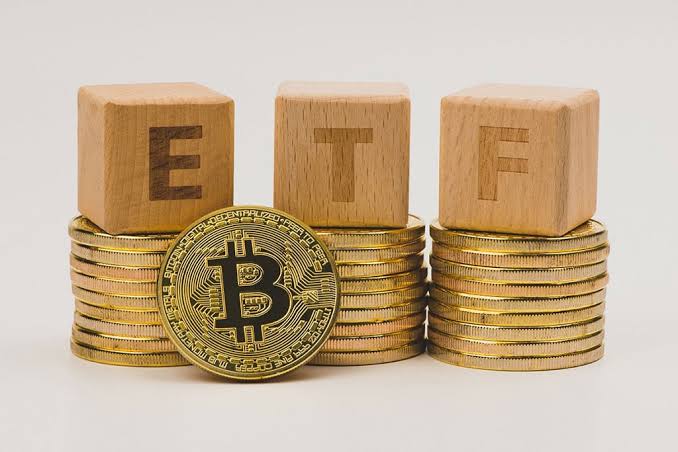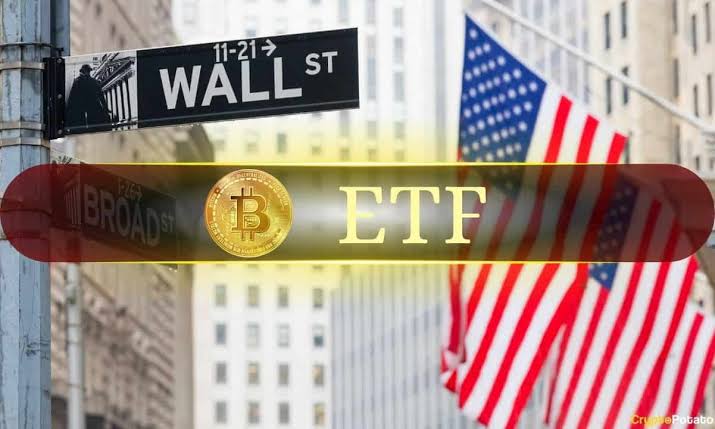The second quarter of 2024 has marked a significant shift in the financial landscape as big Wall Street investors have increasingly turned their attention to Bitcoin Exchange-Traded Funds (ETFs). This move highlights the growing acceptance of cryptocurrency as a mainstream asset class and underscores the evolving strategies of major financial players. This article delves into the reasons behind this trend, its implications for the market, and what it means for the future of Bitcoin and cryptocurrency investments.

Introduction to Bitcoin ETFs
Bitcoin ETFs are investment funds that track the price of Bitcoin and are traded on traditional stock exchanges. These funds allow investors to gain exposure to Bitcoin without directly purchasing the cryptocurrency, which can be complex and risky due to the volatile nature of the market. Bitcoin ETFs offer a more accessible and regulated way for investors to participate in the crypto market, making them an attractive option for both individual and institutional investors.
Why Big Wall Street Investors Are Interested in Bitcoin ETFs
Several factors have contributed to the growing interest of big Wall Street investors in Bitcoin ETFs during Q2 2024:
- Mainstream Acceptance of Cryptocurrency: Over the past few years, Bitcoin has gradually gained recognition as a legitimate asset class. Major financial institutions, including banks and hedge funds, have started to include Bitcoin in their portfolios. This mainstream acceptance has been fueled by the increasing use of Bitcoin as a store of value and a hedge against inflation.
- Regulatory Clarity: The regulatory environment around Bitcoin and cryptocurrencies has become clearer, especially in the United States. The approval of Bitcoin ETFs by regulatory bodies such as the Securities and Exchange Commission (SEC) has provided a level of legitimacy and security that has attracted big Wall Street investors. The clear guidelines have reduced the perceived risks associated with investing in Bitcoin, making it more palatable for institutional investors.
- Diversification: Bitcoin ETFs offer an opportunity for investors to diversify their portfolios. With the traditional financial markets experiencing volatility due to economic uncertainties, investors are looking for alternative assets that can provide uncorrelated returns. Bitcoin, known for its independence from traditional market movements, is seen as a potential hedge against market downturns.
- Technological Advancements: The development of financial technology has made it easier for investors to access Bitcoin and other cryptocurrencies. Platforms that facilitate the trading of Bitcoin ETFs have become more sophisticated and user-friendly, reducing barriers to entry for institutional investors.
- Inflation Concerns: Rising inflation has been a significant concern for investors in 2024. Bitcoin is often viewed as a hedge against inflation, similar to gold. As inflation rates increase, big Wall Street investors are seeking assets that can preserve value over time, leading to increased interest in Bitcoin ETFs.
Major Wall Street Investors Entering the Bitcoin ETF Market

During Q2 2024, several high-profile Wall Street investors and institutions have made substantial investments in Bitcoin ETFs. This section explores some of the most notable players and their strategies:
- Hedge Funds: Hedge funds have been at the forefront of the move into Bitcoin ETFs. Known for their aggressive investment strategies and willingness to explore alternative assets, many hedge funds have allocated a portion of their portfolios to Bitcoin ETFs. These investments are often part of a broader strategy to capitalize on the potential upside of Bitcoin while managing risks through diversification.
- Pension Funds and Endowments: Traditionally conservative investors, pension funds, and endowments have started to dip their toes into the Bitcoin market through ETFs. The growing acceptance of Bitcoin as a store of value and a potential inflation hedge has made it an attractive option for these long-term investors. By investing in Bitcoin ETFs, these institutions can gain exposure to the cryptocurrency market without the complexities of directly holding Bitcoin.
- Wealth Management Firms: Wealth management firms, which manage the assets of high-net-worth individuals, have also begun to include Bitcoin ETFs in their investment offerings. These firms recognize the growing demand from clients for exposure to digital assets and see Bitcoin ETFs as a secure and regulated way to meet this demand.
- Investment Banks: Some of the biggest names on Wall Street, including Goldman Sachs and JPMorgan, have shown interest in Bitcoin ETFs. These institutions have not only invested in these ETFs but have also started offering related products to their clients. This move signals a broader acceptance of Bitcoin as part of the traditional financial ecosystem.
The Impact on the Bitcoin Market

The entry of big Wall Street investors into the Bitcoin ETF market has had several significant impacts on the broader Bitcoin market:
- Increased Demand for Bitcoin: As Wall Street investors buy into Bitcoin ETFs, the demand for Bitcoin itself has increased. This demand drives up the price of Bitcoin, benefiting existing holders and potentially attracting even more investors to the market.
- Price Stability: The involvement of institutional investors can contribute to greater price stability in the Bitcoin market. These investors tend to have longer-term investment horizons and are less likely to engage in speculative trading, which can reduce the volatility that has historically characterized the Bitcoin market.
- Market Legitimacy: The participation of big Wall Street investors adds legitimacy to the Bitcoin market. As more traditional financial institutions and investors enter the space, Bitcoin is increasingly seen as a credible and respectable asset class. This shift in perception can lead to broader adoption and integration of Bitcoin into the global financial system.
- Regulatory Scrutiny: While the entry of big Wall Street investors into the Bitcoin ETF market has brought legitimacy, it has also attracted increased regulatory scrutiny. Governments and regulatory bodies are paying closer attention to the cryptocurrency market, leading to potential changes in regulations that could impact the future of Bitcoin ETFs.
Risks and Challenges

Despite the positive developments, there are also risks and challenges associated with the growing interest of Wall Street investors in Bitcoin ETFs:
- Market Volatility: While institutional investors can contribute to price stability, the Bitcoin market remains inherently volatile. Significant price fluctuations can occur, and even institutional investors are not immune to the risks associated with such volatility.
- Regulatory Risks: The regulatory environment for cryptocurrencies is still evolving. Future regulations could impact the operation of Bitcoin ETFs, potentially affecting their performance and attractiveness to investors. The possibility of stricter regulations poses a risk to the continued growth of the Bitcoin ETF market.
- Technological Risks: The infrastructure supporting Bitcoin and Bitcoin ETFs, including exchanges and custodial services, is still developing. Security breaches, technical failures, or other technological issues could undermine investor confidence and impact the market.
- Market Manipulation: The Bitcoin market has faced concerns about manipulation, given its relatively small size compared to traditional financial markets. The involvement of large institutional investors could exacerbate these concerns if their activities lead to significant market movements.
- Concentration of Ownership: As big Wall Street investors accumulate significant holdings in Bitcoin ETFs, there is a risk of market concentration. If a small number of investors hold large positions, their actions could have outsized effects on the market, leading to increased volatility or liquidity issues.
The Future of Bitcoin ETFs and Wall Street Involvement

The involvement of big Wall Street investors in Bitcoin ETFs is likely to continue growing in the coming years. Several trends and developments could shape the future of this market:
- More ETF Approvals: As the regulatory environment becomes more favorable, we can expect to see more Bitcoin ETFs approved by regulators around the world. This increased availability of ETFs will likely attract more institutional investors and contribute to the growth of the market.
- Diversification of Cryptocurrency ETFs: Beyond Bitcoin, there is potential for the development of ETFs that track other cryptocurrencies or baskets of digital assets. This diversification could appeal to investors seeking broader exposure to the cryptocurrency market.
- Integration with Traditional Financial Products: As Bitcoin ETFs become more established, they may be integrated with other traditional financial products, such as mutual funds or retirement accounts. This integration would make it even easier for investors to gain exposure to Bitcoin as part of a diversified portfolio.
- Increased Competition: As more Wall Street firms enter the Bitcoin ETF market, competition will likely intensify. This competition could lead to the development of more innovative products, lower fees, and better services for investors.
- Global Adoption: The adoption of Bitcoin ETFs is not limited to the United States. As other countries approve their own Bitcoin ETFs, the global market for these products will expand, attracting investors from around the world and further driving the growth of the cryptocurrency market.
Some additional terminologies

1. Institutional Investors in Cryptocurrency
Institutional investors, such as hedge funds, pension funds, and investment banks, are increasingly entering the cryptocurrency market, particularly through Bitcoin ETFs. These investors view cryptocurrencies as a new asset class that can provide diversification and potential returns, especially as digital assets gain broader acceptance.
2. Bitcoin ETF Adoption
The adoption of Bitcoin ETFs allows investors to gain exposure to Bitcoin through a regulated and accessible financial instrument. This growing trend is driven by the desire for a safer and more convenient way to invest in Bitcoin, attracting both individual and institutional investors.
3. Wall Street Cryptocurrency Investments
Big Wall Street investors are increasingly investing in cryptocurrency, signaling a shift in the traditional financial sector. This trend highlights the growing confidence in digital currencies as viable investment opportunities and reflects a broader integration of cryptocurrencies into mainstream finance.
4. Q2 2024 Bitcoin Market Trends
During Q2 2024, the Bitcoin market saw significant developments, including increased interest from institutional investors and the growing popularity of Bitcoin ETFs. These trends indicate a maturing market where Bitcoin is becoming a staple in diversified investment portfolios.
5. Cryptocurrency Exchange-Traded Funds
Cryptocurrency ETFs, especially those focused on Bitcoin, are gaining traction as a popular investment vehicle. These funds offer a way for investors to access the cryptocurrency market without directly holding digital assets, providing a layer of security and regulatory oversight.
6. Mainstream Crypto Investments
The entry of big Wall Street investors into Bitcoin ETFs represents the mainstreaming of crypto investments. As more traditional financial institutions embrace cryptocurrencies, the market is becoming more stable and widely accepted, paving the way for broader adoption.
7. Financial Institutions and Bitcoin ETFs

Financial institutions are increasingly offering Bitcoin ETFs as part of their investment products, catering to the growing demand from clients. These ETFs are seen as a way to bridge the gap between traditional finance and the emerging world of digital assets.
8. Crypto Asset Management
Crypto asset management involves the professional handling of cryptocurrency investments, including through vehicles like Bitcoin ETFs. As big Wall Street investors enter this space, the strategies and tools for managing digital assets are becoming more sophisticated.
9. Digital Currency ETFs
Digital currency ETFs, particularly those focused on Bitcoin, are becoming a key investment strategy for big Wall Street investors. These ETFs offer exposure to the volatile yet potentially lucrative cryptocurrency market, appealing to investors seeking diversification.
10. Bitcoin in Traditional Finance
The integration of Bitcoin into traditional finance is accelerating, with big Wall Street investors driving the adoption of Bitcoin ETFs. This development signals a broader acceptance of Bitcoin as a legitimate financial instrument and a new frontier in investment strategies.
11. Institutional Interest in Bitcoin
Institutional interest in Bitcoin is growing, as evidenced by the increased investments in Bitcoin ETFs by big Wall Street investors. This interest is driven by the potential for high returns, portfolio diversification, and the growing legitimacy of cryptocurrencies.
12. Investment Strategies for Bitcoin ETFs
Investment strategies for Bitcoin ETFs are evolving as big Wall Street investors seek to capitalize on the growth of the cryptocurrency market. These strategies often involve balancing the risks of Bitcoin’s volatility with the potential for significant returns.
13. Wall Street and Digital Assets
Wall Street’s involvement in digital assets, particularly through Bitcoin ETFs, marks a significant shift in the financial landscape. As more traditional investors embrace digital currencies, the lines between conventional finance and the crypto market are blurring.
14. Cryptocurrency Market Analysis

Analyzing the cryptocurrency market, especially in light of the growing interest from big Wall Street investors, reveals trends such as increased institutional adoption, regulatory developments, and the impact of Bitcoin ETFs on market dynamics.
15. Impact of Institutional Investments on Bitcoin
Institutional investments in Bitcoin, particularly through ETFs, have a profound impact on the cryptocurrency’s market dynamics. These investments contribute to price stability, increased liquidity, and the overall maturation of the Bitcoin market, attracting more investors.
These explanations emphasize the role of big Wall Street investors in driving the growth and legitimacy of Bitcoin ETFs and the broader cryptocurrency market.
Conclusion
The increasing interest of big Wall Street investors in Bitcoin ETFs during Q2 2024 marks a pivotal moment in the evolution of the cryptocurrency market. This trend reflects the growing acceptance of Bitcoin as a legitimate asset class and underscores the broader integration of digital assets into the traditional financial system.
While the involvement of institutional investors brings numerous benefits, including increased demand, price stability, and market legitimacy, it also presents challenges such as regulatory risks, market volatility, and the potential for market manipulation.
Looking ahead, the continued growth and development of the Bitcoin ETF market will depend on several factors, including regulatory developments, technological advancements, and the actions of big Wall Street investors. As the market evolves, investors and stakeholders will need to stay informed and adapt to the changing landscape to capitalize on the opportunities and mitigate the risks associated with Bitcoin ETFs.